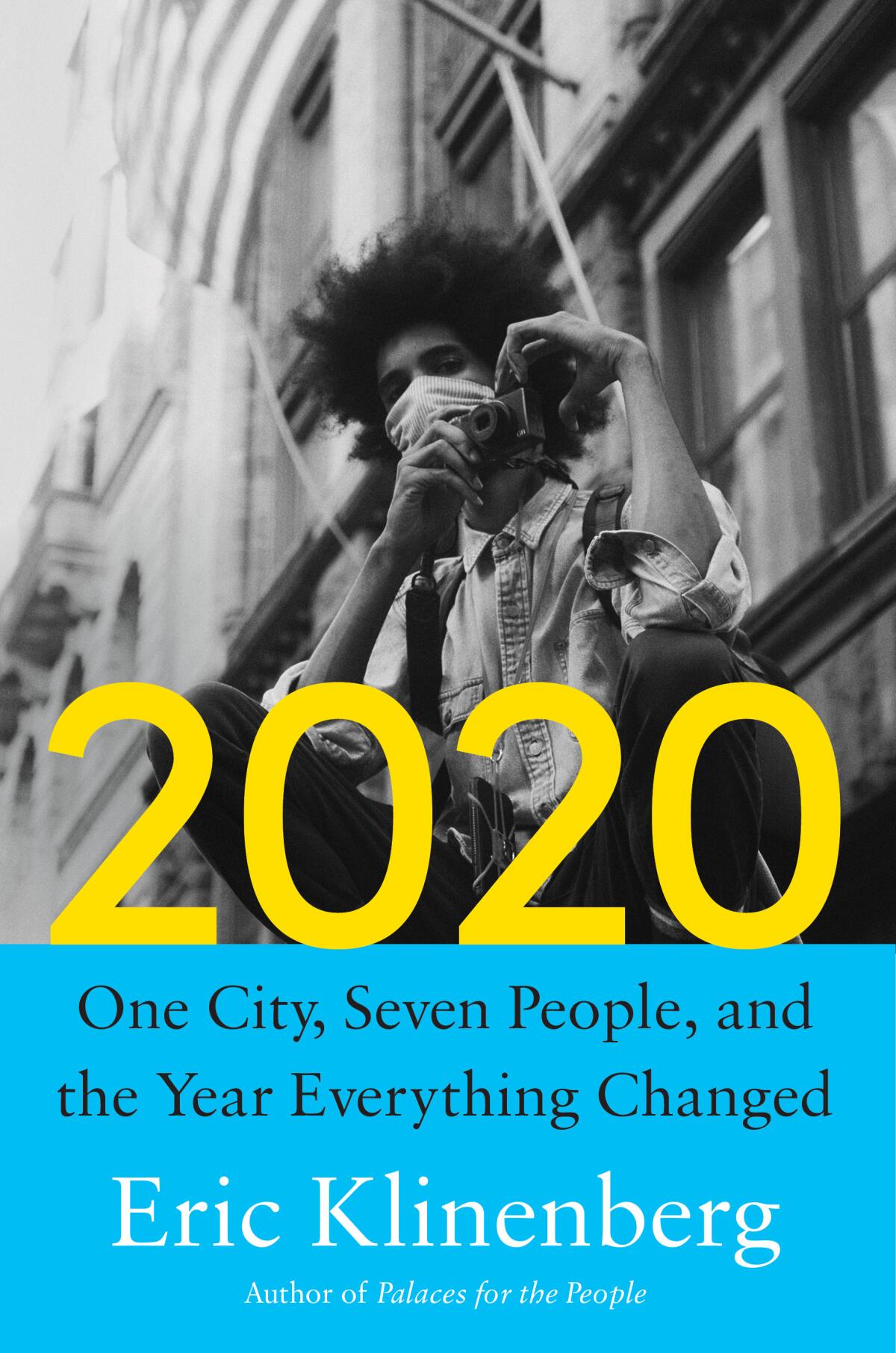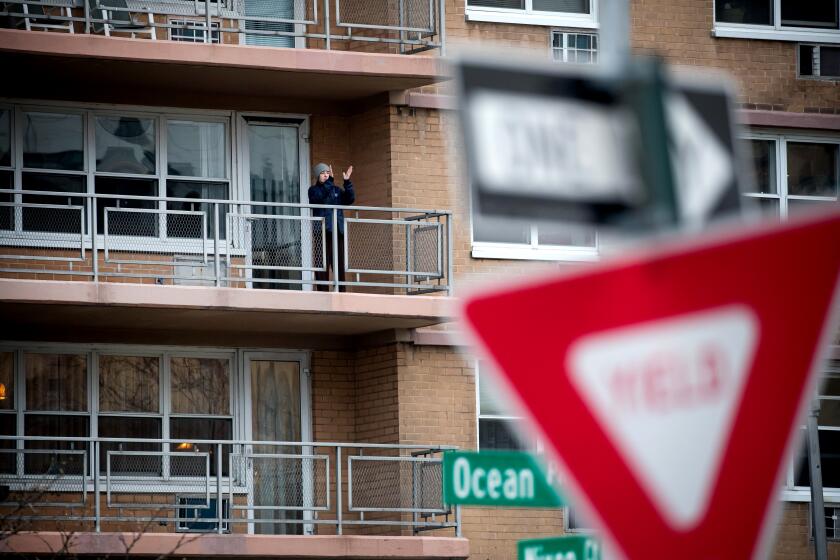Eric Klinenberg wants you to reexamine the impact of the pandemic: ‘We are all living through the long 2020’

On the Shelf
2020: One City, Seven People, and the Year Everything Changed
By Eric Klinenberg
Knopf Publishing Group: 464 pages, $32
If you buy books linked on our site, The Times may earn a commission from Bookshop.org, whose fees support independent bookstores.
Eric Klinenberg wants you to remember what was, collectively, the worst year of our lives. But he doesn’t just want you to recall 2020 — the pandemic with its lockdown and rising death toll, the attempt at a racial reckoning after George Floyd’s murder and the presidential election where the loser refused to accept reality — he wants you to reexamine it.
“This story is not over,” he said. “We are all living through the long 2020.”
Klinenberg knows a litany of facts and a political recounting would turn readers off. His new book, “2020: One City, Seven People, and the Year Everything Changed,” has plenty of statistics and a scope wide enough to examine the way countries around the world dealt with COVID-19, but the subtitle makes his intimate approach clear.
“I wanted the soul of the book to be these people,” he said by video from his Manhattan apartment. (All seven were also New Yorkers.) “It’s an invitation to reconsider your own experience and the experience of people you love through their lens, which can help all of us make sense of what happened.”

His subjects include Sophia Zayas, a Puerto Rican living in the Bronx who worked for Gov. Andrew Cuomo’s administration and was tasked with encouraging the community to get vaccinated, even though Zayas herself was initially skeptical. “People there know the history of the U.S. experimenting on people of color and treating them badly,” Klinenberg says, noting that while Zayas eventually came around on vaccines, “we can’t paper over that.”
At the other end of the city and the political spectrum is bar owner Daniel Presti, a Staten Island Republican who became a hero to the far right when he refused to comply with restaurant closure orders and mask mandates. “I treat him sympathetically,” Klinenberg says, even though Presti eventually stopped talking to him. “I wanted readers to understand where people in his situation are coming from so that we can make sense of this incredible change in American civic life.”
This interview has been edited for length and clarity.
I can easily see this book being invaluable in the future but why is it important now for all of us who just lived through 2020?
So much was happening to us in real time, it was impossible to process it. We’ve been shaped by 2020 in ways we haven’t appreciated.
And it feels like there’s an urgency to it. Trump was a big part of the reason that the United States fared so poorly in the pandemic.
One reason Trump has retained so much popularity is because we’ve all repressed what happened in 2020. Sometimes he says, “Are you better off than you were five years ago?” It’s like a pilot who says, “Did you see that takeoff? It was fantastic. Wasn’t it exhilarating to be at 35,000 feet? That whole crash landing where half the people on the plane died — forget that part.” We’re a country full of people who forgot about the crash landing and it’s my belief that that crash landing was not inevitable.
In previous crises, societies around the world learned lessons and worked hard to make things better before the next disaster. In the United States, we’ve become more skeptical of government and of all vaccines and we’re cutting funding for key public health programs. And we now have prominent political officials on the right telling a revisionist history. There’s a persuasive argument that we are less prepared, more vulnerable to the next big pandemic than we were before 2020.
A lot of other societies did not crash. Australia, which had a right-wing prime minister who was a science denier, had a negative excess death rate in 2020. So nothing was inevitable in the American experience. As we figure out who to vote for in 2024, who we trust to lead us through difficult times, we need to be looking at what happened to us when everything was up for grabs and not pretend it didn’t exist. I think now the time is right.
In ‘Fourteen Days,’ the Authors Guild shows off its storytellers, including Dave Eggers, Celeste Ng, Scott Turow, Mira Jacob, Tommy Orange, Tess Gerritsen, R. L. Stine, Weike Wang and Ishmael Reed.
Was it difficult spending three years reliving the worst year of our lives?
This was a way for me to organize my anxieties, rather than just letting my mind wander and spin uncontrollably, waking me up at 3 in the morning. In that sense this project has been extremely healthy.
I’ve spent my career studying crises. Crises reveal things. We see who we are, what we value and whose lives matter. The disaster is for a sociologist what a particle accelerator is for a physicist. It allows you to see things that you wouldn’t otherwise be able to see. So it’s really worthwhile to look closely when everyone else is running away.
But it’s definitely hard.
You analyzed nearly 18,000 social media posts about COVID-19. What did you learn that you couldn’t have guessed already?
It was striking to see just how rich a world someone could live in online while still only getting one side of the story. And once you immerse yourself in the online universe of a person who sees things differently than you, you realize it’s very difficult for them to come around to another point of view; the echo chambers are real.
It really solidified for me the extent to which people were experiencing different pandemics based not only on where they lived but also on where they clicked. I wanted the book to illustrate why America grew so divided during this difficult year — we really didn’t share the year; we really did live different catastrophes.
Your book makes clear how badly America failed the poor and people of color.
That’s such an important point for me. Crises reveal things — we called some people essential workers. It wasn’t the bankers, the lawyers, or even the NBA players. It was healthcare workers, of course, and all these low-wage workers. You’d think “essential” is an honorific that would come with respect and resources, guarantees of healthcare and PPE and scholarships and all kinds of support. But when we called them essential, what we were really doing was deeming them expendable. It meant we don’t really mind if you die.
We did come to the edge of this moral precipice in 2020, where it felt for a moment like we were about to make this breakthrough, valuing and recognizing the contributions of essential workers.
We did things like the Child Poverty Reduction Act, which brought more kids out of poverty than ever before in American history. But as soon as things got a little better, we said, “Nah, forget about it. Let’s go back.” And we didn’t make sure that everybody had childcare and we didn’t fix the nursing homes. That’s a reason why a lot of Americans feel betrayed.
We have not lived up to our principles as a society.
That’s depressing.
Beyond all the things that went wrong, beautiful things happened. I write about Nuala O’Doherty, who started this network in Queens that fed tens of thousands of people and stands as a symbol for this kind of grassroots effort that ordinary people made to take care of each other.
And after the pandemic she transformed her basement into the Jackson Heights Immigration Center. They’ve helped 2,000 immigrant families file asylum paperwork and became this incredible neighborhood resource for people from all over the region who need legal help. All across America people who started working together during COVID have reassembled and adapted their mission to deal with the problems of 2024. So there’s this new informal civic infrastructure rising.
With this election coming, it’s important to see this deeply American alternative, bottom-up approach to helping each other out. It still feels to me like everything’s up for grabs. And we’re the people who are going to decide the fate of the country.
More to Read
Sign up for our Book Club newsletter
Get the latest news, events and more from the Los Angeles Times Book Club, and help us get L.A. reading and talking.
You may occasionally receive promotional content from the Los Angeles Times.







